Rameswaram Temple, commonly referred to as Ramanathaswamy Temple, holds immense significance as a Hindu pilgrimage destination situated in Tamil Nadu. This sacred site, dedicated to Lord Shiva, is one of the twelve Jyotirlingas and is regarded as one of the holiest shrines for devotees of Shiva. It is particularly famous for its elaborate architecture, which features the longest temple corridor in the world. The temple’s profound connection to the Ramayana enhances its spiritual value. It is believed that Lord Rama worshipped at this site before his expedition to Lanka. One could visit here to explore the deep spiritual significance.
Rameswaram Temple Location

Photo: RakeshRaju M / Wikimedia Commons
Rameswaram is conveniently linked to surrounding cities and towns. The distance from Chennai, the capital of Tamil Nadu, is approximately 560 km, while Madurai, which is the nearest major city with an airport, lies about 173 km away. In addition, Kanyakumari, the southernmost point of India, is located roughly 300 km from the temple. Rameswaram is also 225 km from Tiruchirappalli and 315 km from Thanjavur. Travellers coming from Kerala can reach Rameswaram from Kochi, situated about 480 km away. Moreover, the town is connected to the mainland via the Pamban Bridge, providing access by both road and rail.
Suggested Read: Places To Visit In Hosur For A Scenic Retreat
How To Reach Rameswaram Temple
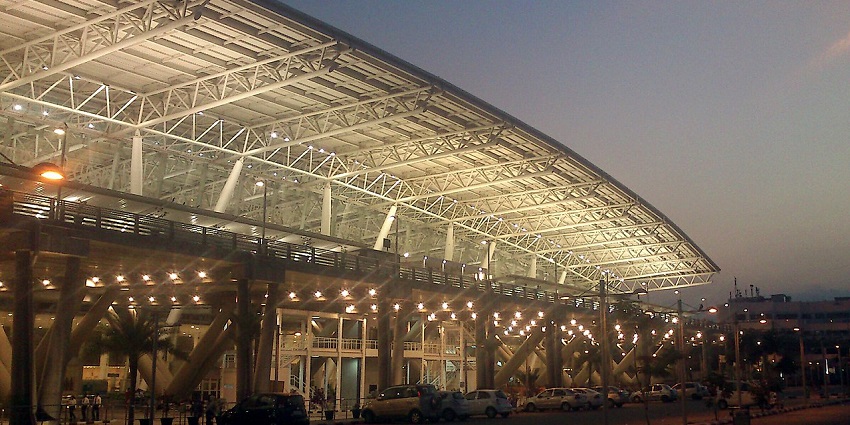
Photo: Tshrinivasan / Wikimedia Commons / Image For Representation Only
Reaching the Rameswaram Temple is quite simple, as it boasts a well-established network of transportation options, including road, rail, and air. Depending on your destination, you can select the most appropriate mode of travel:
By Train: Rameswaram boasts a railway station that links it to significant cities such as Chennai, Madurai, and Coimbatore. Regular train services are operational, which include express options, thus offering an affordable and picturesque means of travel.
By Air: The closest airport is located in Madurai, approximately 173 km away. This airport provides connections to major Indian cities like Chennai, Bengaluru, and Delhi. Once you arrive at the airport, taxis and buses are readily available to transport you to Rameswaram.
By Road: Rameswaram is linked via the National Highway (NH49) to several key cities. You have the option to drive or take a bus from locations such as Madurai, Chennai, or Kanyakumari. The drive offers breathtaking views, particularly when traversing the Pamban Bridge.
Top 5 Places To Visit Near Rameswaram
Rameswaram presents a diverse array of spiritual and natural attractions beyond its famous temple. This makes it a significant destination for both pilgrims and travellers:
1. Ram Setu

Photo: THK / Wikimedia Commons
Ram Setu is a series of natural limestone shoals that extend between Pamban Island (Rameswaram) in India and Mannar Island in Sri Lanka. According to the ancient epic Ramayana, this bridge was constructed by Lord Rama’s army of Vanaras to facilitate their crossing to Lanka to rescue Sita. This structure, often called a “floating bridge,” has intrigued both scientists and spiritual devotees due to its unique blend of geological significance and spiritual importance. The closest vantage point for viewing Adam’s Bridge is Dhanushkodi, a once-thriving town that was devastated by a cyclone in 1964.
Timings: Open 24 hours
Entry Fee: Free
Suggested Read: Things To Do In Anaikatti For A Nature Lover’s Paradise
2. Panchmukhi Hanuman Temple
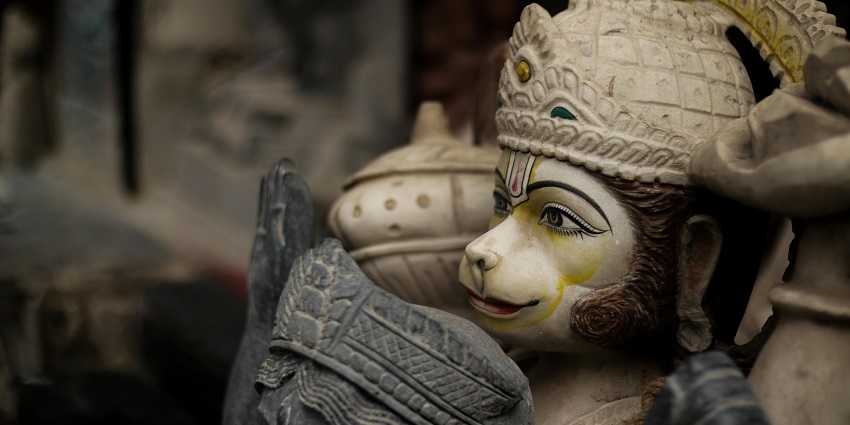
Photo: SOUMEN MAJI / Pexels / Image For Representation Only
The Panchmukhi Hanuman Temple is a famous shrine in Rameswaram that is celebrated for its five-faced (Panchmukhi) idol of Hanuman. Each face of this idol symbolises distinct deities: Hanuman, Narasimha, Garuda, Varaha, and Hayagriva. This temple carries profound significance within the Ramayana, as it is thought to honour Lord Hanuman’s pivotal role in the construction of the Ram Setu. What makes this temple particularly distinctive is the exhibition of floating stones, which are believed to have been utilised in the building of the Ram Setu. Devotees and tourists can observe them, which defy science by floating on the water despite being dense.
Timings: 6 AM – 7 PM
Entry Fee: Free
3. Rameswaram Jyotirlinga
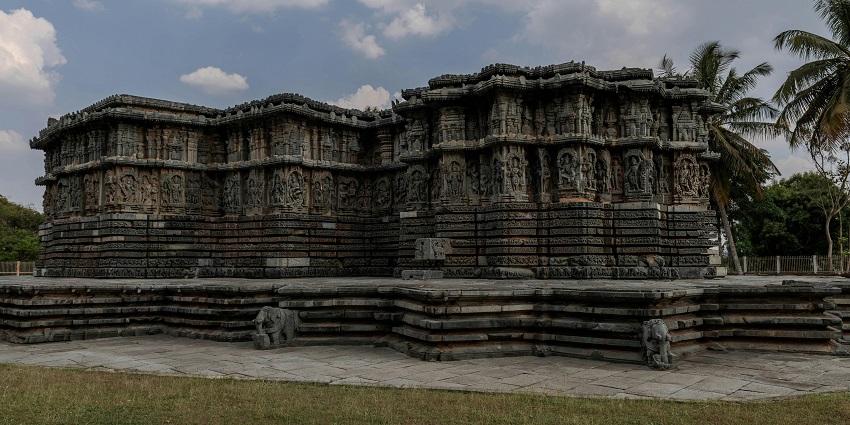
Photo: Roman Saienko / Pexels / Image For Representation Only
The Rameswaram Jyotirlinga, located within the renowned Ramanathaswamy Temple, is one of the twelve revered Jyotirlingas dedicated to Lord Shiva. The temple itself is an architectural wonder, with its majestic gopurams and the longest temple corridor in the world. The Jyotirlinga serves as the temple’s centrepiece, attracting pilgrims from around the globe to seek spiritual purification and divine blessings. Rituals, particularly the abhishekams (the ceremonial bathing of the deity), are conducted daily. It is believed that a visit to the Rameswaram Jyotirlinga can absolve one’s sins and confer moksha (liberation).
Timings: 5 AM – 1 PM; 3 PM – 9 PM
Entry Fee: Free
Suggested Read: Things To Do In Kumbakonam For A Refreshing Retreat
4. Lakshmana Tirtham
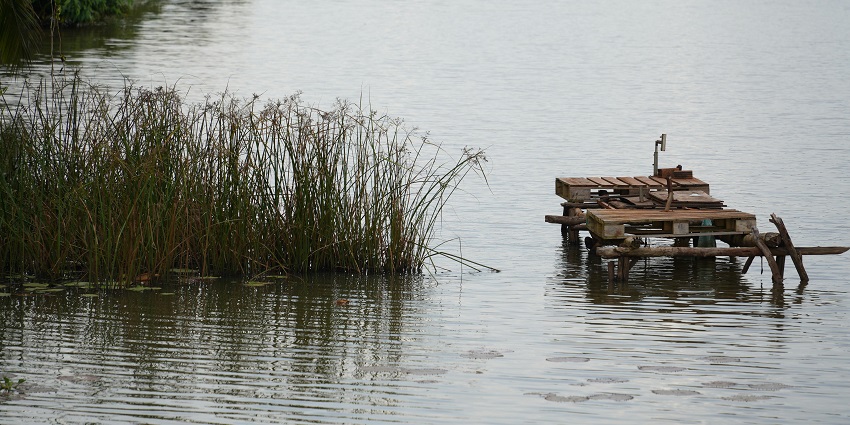
Photo: Nguyễn Thành Nhơn / Pexels / Image For Representation Only
Lakshmana Tirtham is a pond situated near the Ramanathaswamy Temple, which holds a significant place in both mythology and history. It is widely believed that Lakshmana immersed himself in these sacred waters to cleanse his sins after the arduous battle in Lanka. This act not only enhances the site’s spiritual resonance but also draws numerous devotees who come to pay homage to Lord Lakshmana. The placid waters, with the intricately adorned temple, create a peaceful ambience for prayer and reflection. Although it is less frequented, it offers a more intimate experience for visitors seeking solace.
Timings: 6 AM – 6 PM
Entry Fee: Free
5. Kunthu Kal Beach

Photo: Flo Dahm / Pexels / Image For Representation Only
Kunthu Kal Beach is a hidden treasure that provides a stunning natural landscape and an ideal escape. Famous for its unblemished golden sands and crystal-clear blue waters, the beach is a haven for individuals seeking relaxation by the sea or enjoying a relaxing stroll along the coastline. It’s relatively visited, especially when compared to other beaches in the vicinity, making it a peaceful refuge for families and couples. Kunthu Kal Beach is also famous for its abundant marine biodiversity, which attracts nature enthusiasts and photographers. You may encounter fishermen engaged in their daily routines or observe breathtaking sunsets.
Timings: Open 24 hours
Entry Fee: Free
Suggested Read: Street Food In Coimbatore
Where To Eat

Photo: Madhubala Ravi / Wikimedia Commons
Rameswaram presents a diverse array of dining experiences spanning from local eateries to more established restaurants. For those seeking authentic South Indian cuisine, Siva Sakthi Bhojanalaya and Sri Murugan Mess are noteworthy choices; they serve traditional Tamil meals on banana leaves. Hotel Guru and Ahaan—The Restaurant offer both vegetarian and multi-cuisine options, encompassing North Indian and Chinese fare. Seafood lovers may find delight at the Gulf of Mannar Restaurant, where fresh catches are prepared in local styles. It is essential to sample local delicacies such as dosas, idlis, and the renowned South Indian filter coffee.
Where To Stay

Photo: Pixabay / Pexels / Image For Representation Only
Rameswaram also has different accommodation options to cater to various budgets. Hotel Royal Park and Hotel Daiwik are popular mid-range selections, providing modern amenities and comfortable rooms. Budget travellers can find suitable options at Hotel Tamil Nadu and Sri Saravana Bhavan Lodge, which offer clean and affordable stays. For those seeking luxury, Hyatt Place offers a more upscale experience, complete with premium services and breathtaking sea-facing views. Many hotels also provide guided tours and assistance with temple visits, which is beneficial for visitors. It is advisable to book in advance, especially during festival seasons and peak pilgrimage times.
Suggested Read: Best Food In Rameshwaram To Try For A Culinary Delight
Best Time To Visit

Photo: Nataliya Vaitkevich / Pexels / Image For Representation Only
The best time to visit Rameswaram temple is between October and April, when the climate is both pleasant and suitable for exploration and temple excursions. During these months, temperatures typically range between 17°C and 30°C, thus allowing comfortable outdoor activities. It is advisable to refrain from travelling during the peak summer months (May to June), as temperatures can exceed 0 °C. The monsoon season (July to September) brings moderate rain, which, although it may hinder outdoor endeavours, brings a welcome coolness to the area.
Other Factors To Consider
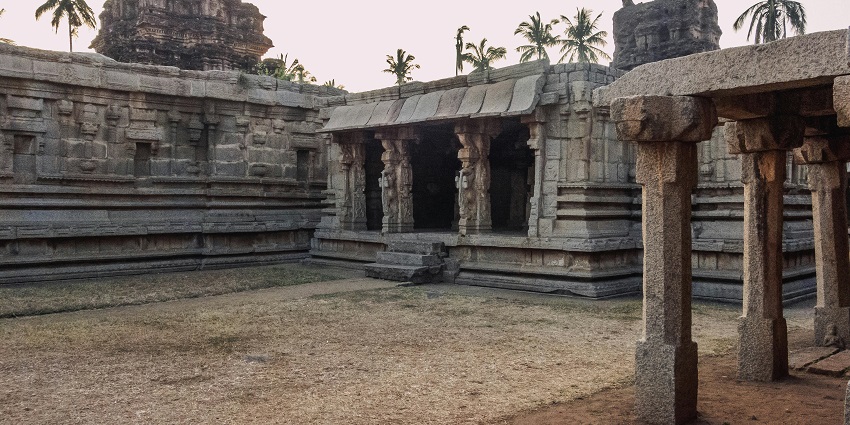
Photo: Roman Saienko / Pexels / Image For Representation Only
When one is planning a journey to Rameswaram, it’s crucial to take into account various factors to ensure that your visit is both smooth and enjoyable.
Average Cost Of The Trip:
The average trip cost to Rameswaram Temple varies significantly based on individual preferences regarding accommodation, travel, and meals. For those on a budget, the costs can fluctuate between INR 2,500 and INR 4,000 daily. This usually encompasses basic lodging, local cuisine, and public transit. Mid-range travellers should anticipate spending roughly INR 5,000 to INR 7,000 each day. This amount often includes more comfortable accommodations, meals in quality restaurants, and private transportation options. Luxury travellers, although they may enjoy a more opulent experience, can see their expenses soar to between INR 10,000 and INR 15,000 per day.
Tips For Travellers:
- When visiting temples, it is essential to wear comfortable footwear
- Modest dress is a must. One should adhere to temple protocols, which often include the removal of shoes before entry.
- Plan your visits early in the morning to avoid not only large crowds but also the intense heat.
- Carry water and snacks to sustain you during excursions to remote areas such as Dhanushkodi and Ram Setu.
- Taking photos at Rameswaram temple is permitted in certain areas. However, it is restricted within the inner sanctum. Always remember to check for signs (this is crucial).
Rameswaram is a destination that is rich in spirituality, history, as well as natural beauty. From the awe-inspiring Rameswaram Temple to the beautiful beaches, there is much to explore. One should be mindful of local customs and should plan the trip during the cooler months. Plan your journey with TripXL and explore the wonders of Rameswaram effortlessly. Book now for a seamless travel experience!
Cover Photo: Wanderlusts / Wikimedia Commons


 WhatsApp
WhatsApp
 Twitter
Twitter









